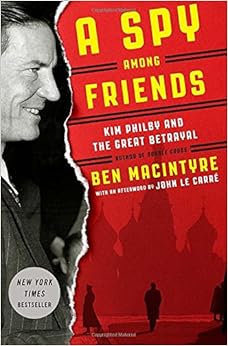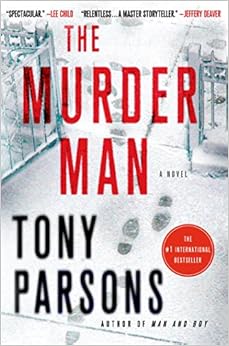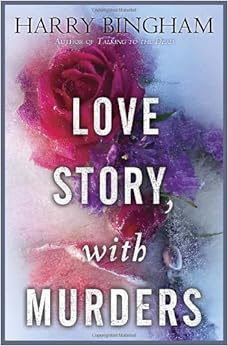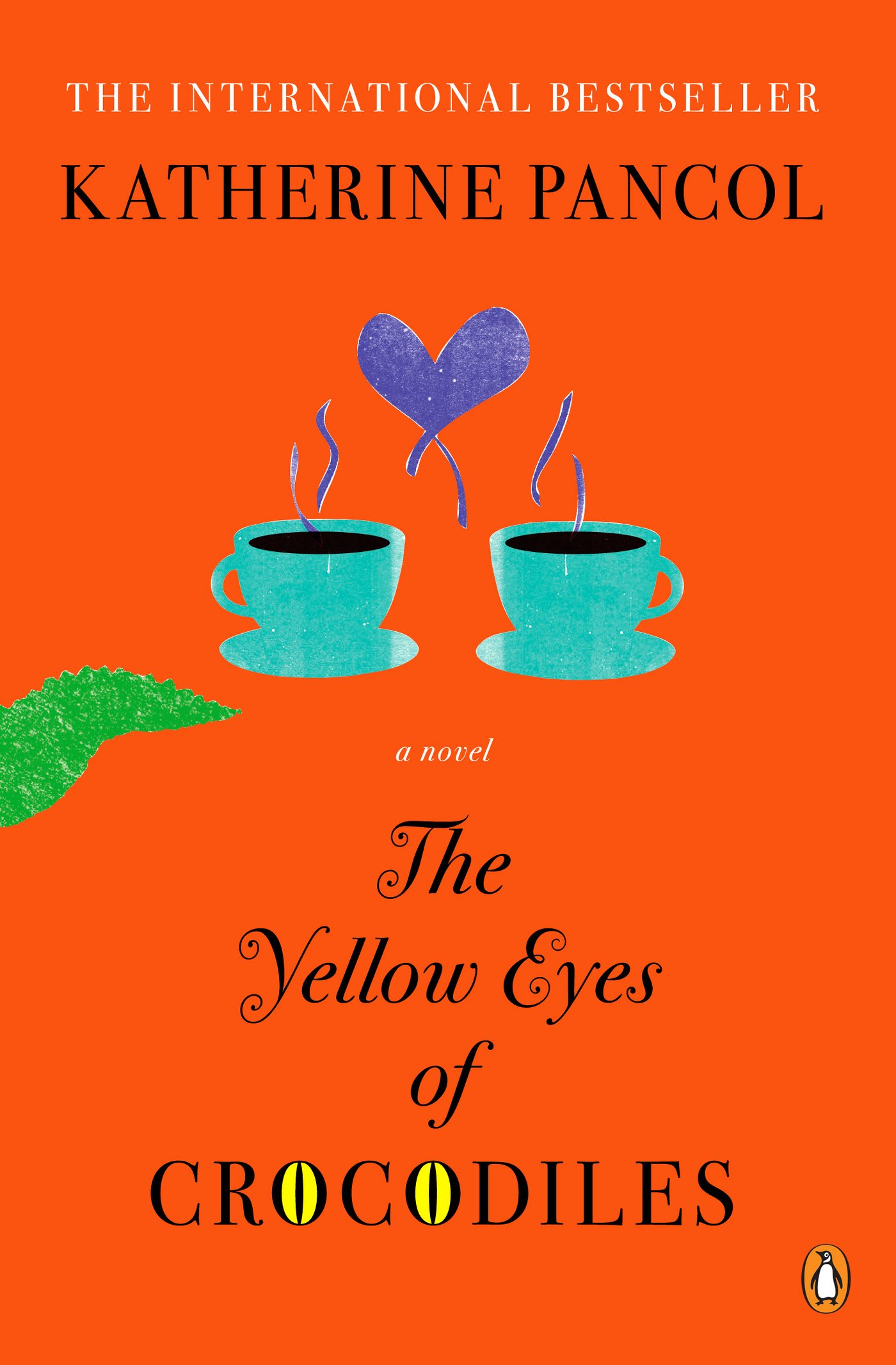As I looked back on my list of 2014 books read, I was surprised to see that nearly all my favorites were written by British authors. I've always been a bit of a reading anglophile, but this was pretty overwhelming. I've talked about several of these as the year went on, but that won't prevent me from twisting your arm again in hopes I can get you to read them.
 If you're a regular reader of Read Me Deadly, you already know what I'm going to say my absolute favorite read of the year was: Ben Macintyre's A Spy Among Friends: Kim Philby and the Great Betrayal (Crown, 2014). This is a near-perfect read for anyone fascinated by the British class system or Cold War espionage––and if both subjects are among your passions, then this is the mother lode.
If you're a regular reader of Read Me Deadly, you already know what I'm going to say my absolute favorite read of the year was: Ben Macintyre's A Spy Among Friends: Kim Philby and the Great Betrayal (Crown, 2014). This is a near-perfect read for anyone fascinated by the British class system or Cold War espionage––and if both subjects are among your passions, then this is the mother lode.To me, the psychology of a traitor to his country is always fascinating, and Philby is all the more intriguing because he was a son of privilege and more than comfortable with the accoutrements of his station. He was proud of being a Cambridge man, enjoyed alcohol-fueled evenings at his ancient London gentlemen's club, loved his Savile Row suits and handmade shoes, and was addicted to reading the Times. Why, then, would he betray all this for a country that had none of these things?
I won't tell you that Macintyre truly explains the conundrum of Philby, though he gives us some shafts of insight. What he does that cements this book for me as a one that I'll have on my shelves forever is to show how Philby's social class insulated him from being found out and punished for so many years. Macintyre details how MI6 (roughly the equivalent of the CIA in the US, while MI5 is similar to the FBI) was an upper-crust milieu that admitted the "right sort" to its ranks and then closed around them in a protective cocoon. Philby's treason––including the hundreds or even thousands of agent deaths it led to––ultimately seemed less important to his colleagues, especially his longtime friend Nicholas Elliott, than his betrayal of his class.
If Macintyre's book is historical nonfiction that reads like a page-turner of a novel, then Robert Harris's An Officer and a Spy (Knopf, 2014) is a novel that illuminates history better than any academic study. I'm sure you know the basics of the Dreyfus Affair: France's false conviction of a Jewish army officer for treason in the late 19th century, his exile to Devil's Island, and the years-long efforts to exonerate him. Harris looks at the story from a different angle, that of Colonel Georges Picquart, an officer who was present when Dreyfus was arrested on charges of passing secret military information to German agents.
Picquart didn't have much of any interest in Dreyfus, and had the same level of anti-Semitic feelings as was sadly typical in the French military and society. But when Picquart was assigned to become chief of the military's secret intelligence bureau, almost by accident he learned that the evidence against Dreyfus was nearly nonexistent, but there was plenty of damning evidence against Major Walsin Esterhazy, a womanizer, gambler and cheat––but not Jewish. Picquart couldn't help pursuing the truth, though it was increasingly dangerous for him to do so within the hierarchy of the military.
Robert Harris wrote Fatherland, to my mind an unparalleled World War II alternative history. I doubt he can ever write anything that will surpass that for me, but he gives it a heck of a good effort with An Officer and a Spy.
So where are the mysteries, I hear you grousing. And to that, I say: What's the matter, you grump, do you still have a hangover of a hangover? But I do have mysteries on my favorites list, never fear.
 It's always a thrill to find a new mystery author. Tony Parsons is a well-known journalist and novelist in Britain, but The Murder Man (Minotaur, 2014; originally published in the UK under the title The Murder Bag) is the first in a planned police procedural trilogy featuring the very human Detective Constable Max Wolfe. Max is a refreshing character for this genre. He has a troubled past, but it's a wrecked marriage, not something much darker. And he spends his evenings at home with his young daughter and their dog, Stan, not wrapped around a liquor bottle.
It's always a thrill to find a new mystery author. Tony Parsons is a well-known journalist and novelist in Britain, but The Murder Man (Minotaur, 2014; originally published in the UK under the title The Murder Bag) is the first in a planned police procedural trilogy featuring the very human Detective Constable Max Wolfe. Max is a refreshing character for this genre. He has a troubled past, but it's a wrecked marriage, not something much darker. And he spends his evenings at home with his young daughter and their dog, Stan, not wrapped around a liquor bottle.The Murder Man begins with a short prologue of sexual violence that nearly had me putting the book aside for good, but I'm glad I didn't, because after that I was treated to a this appealing new protagonist and his family, and a plot with plenty of depth and sense of place. Parsons also throws in issues of privilege, power, inequality and media manipulation, all of which add to the richness of the story.
An even better-known English novelist decided to turn to mystery writing recently. That's J. K. Rowling, of Harry Potter fame, who began her Cormoran Strike series in 2013, with The Cuckoo's Calling, published under the pseudonym Robert Galbraith. Cormoran Strike returned earlier this year in The Silkworm (Mulholland Books, 2014). This is a leaner story than The Cuckoo's Calling, and I think it's the better for it. In this entry, Strike is persuaded to drop an obnoxious––but lucrative––corporate client in favor of a nonpaying job to track down writer Owen Quine.
As Cormoran investigates, he learns that Quine has a reputation for being no less obnoxious than his erstwhile client. But Quine is hardly alone in that. Rowling's book is at least as much a thinly-veiled exposé of the publishing world as a detective novel. She paints vivid portraits of a variety of distasteful characters, including the harpy who is Quine's agent, a creepy publisher, a drunken editor, a supremely narcissistic and unpleasant literary rival of Quine's and at least a dozen more minor, mostly unpleasant, personalities.
Rowling makes the publishing milieu deliciously nasty, while her protagonist and his protegée, Robin Ellacott, are people you'd want to have on your side if you ever happen to run into trouble in London. I hope they return in another adventure this year.
 Speaking of appealing protagonists, one of my more recent favorites made another appearance this year. Fiona Griffiths is a most unusual person and Detective Constable. Buried deep in her subconscious is a traumatic event from her childhood. She knows it's there, but she doesn't know what it is. But, like a virus, it flares up from time to time in the form of Cotard's syndrome, a condition in which dissociation and depression combine to make her lose touch with her physical and emotional feelings, turn the world into shades of gray and, in its worst stages, make her believe that she is literally dead.
Speaking of appealing protagonists, one of my more recent favorites made another appearance this year. Fiona Griffiths is a most unusual person and Detective Constable. Buried deep in her subconscious is a traumatic event from her childhood. She knows it's there, but she doesn't know what it is. But, like a virus, it flares up from time to time in the form of Cotard's syndrome, a condition in which dissociation and depression combine to make her lose touch with her physical and emotional feelings, turn the world into shades of gray and, in its worst stages, make her believe that she is literally dead.That sounds like a real laugh riot––not––right? Believe me, though, it actually can be. The series books are written in the first person and are in near-equal parts about the case at hand, Fiona's attempts to find out about her past, and about her strenuous efforts to stay firmly resident on "Planet Normal."
In the second book in the series, Love Story, With Murders (Delacorte, 2014), Fiona and her comrades at the Cardiff (Wales) police department are investigating the finding of dismembered bodies in an assortment of odd locations in a quiet suburban neighborhood. With morbid humor, they call the case Stirfry. Fiona herself combines sympathy for victims of crime and their families with a maverick style at work that often lands her in hot water. These books are narrated in the first person, which is the perfect choice since the inside of Fiona's head is an eccentric and often very funny place.
In Bryant & May and the Bleeding Heart (Bantam, 2014), Number 11 in the series, the plot elements are even odder than usual, combining corpses rising from the dead and raven-napping from the Tower of London. The PCU is in a new HQ––just as ramshackle as the old one but now replete with kittens––and they are now under the jurisdiction of the historic City of London. Gone is their old nemesis top boss, the saturnine Oscar Kasavian, replaced with the dressed-for-success Orion Banks, who talks in management-speak and is dismayed to find that the PCU is unlikely to add policing statistics that will help fuel her rise up the rungs of the professional ladder. She and Arthur Bryant are not a match made in heaven.
Despite the outlandishness of the plot, Arthur Bryant is a little less outrageous than usual. He's feeling his years and wonders if he's become extraneous. His introspection is a welcome opening of another dimension into this character, though it's an unwelcome reminder that this series must inevitably someday come to an end.
 I'd like to say my next book sticks with the theme of eccentricity, but I think "eccentric" is too limiting a box for William Heming, the subject of Phil Hogan's brilliant A Pleasure and a Calling (Picador, January 6, 2015, though currently available in the US in audiobook form and published in 2014 in the UK). He's an estate agent in a leafy and prosperous village within commuting distance of London. He's quite successful, but not at all showy. In fact, people rarely notice him, and what a handy thing that is for him, being a sociopath and all.
I'd like to say my next book sticks with the theme of eccentricity, but I think "eccentric" is too limiting a box for William Heming, the subject of Phil Hogan's brilliant A Pleasure and a Calling (Picador, January 6, 2015, though currently available in the US in audiobook form and published in 2014 in the UK). He's an estate agent in a leafy and prosperous village within commuting distance of London. He's quite successful, but not at all showy. In fact, people rarely notice him, and what a handy thing that is for him, being a sociopath and all.In the apartment to which no guest is ever invited, William keeps a key to every house he's ever sold. He likes to keep tabs on their residents. Usually, that's all he does, but sometimes he feels more is warranted. Someone who is a bad neighbor might need a bit of correction. For example, if he doesn't clean up after his dog, well, that mess might just end up the centerpiece of the man's white carpet. But when Heming finds himself falling for a young woman and learns that a particularly distasteful married man is her lover, things quickly get very much out of hand.
"Creepy" is the adjective most often applied to this novel, but it's the most deliciously enjoyable kind of creepy and I urge you to meet William Heming yourself. And if you haven't changed your locks since you bought your house, think about it.
Another odd English protagonist, though not at all creepy, is Frank Shaw in Robert Glancy's Terms & Conditions (Bloomsbury USA, 2014). Shaw is part of a particular sub-type of English male, the man who apologizes when someone else bumps into him and uncomplainingly lets other people always have their way. But when we begin the book, Frank doesn't know that about himself, because he's suffered a traumatic brain injury in a car accident and doesn't remember much of anything.
Though Frank has amnesia, he also has synesthesia, where the sight of people and certain objects triggers sounds, colors, smells and strong emotions. There's a nasty, rancid green smell around the fat, smug, smartly-dressed man who says he's Frank's older brother, Oscar. That slim, sophisticated woman named Alice, who says she's Frank's wife, evokes confusing feelings, but when Frank gets home, the sight of a box of copies of her book, titled Executive X, fills him with rage. And when, rummaging around the house, he finds a jar with a preserved pinky finger floating around in it, he feels elated. What's that about?
Frank slowly begins to put his life together, at least enough to return to work, where he is a junior member of the family law firm, run by Oscar. Frank's specialty is writing contracts, in particular the fine-print terms and conditions that generally put the lie to all the promises in the large print. As flashes of memory pierce the fog, Frank learns that the terms and conditions of his own life are just as contradictory to what Oscar and Alice keep telling him. Maybe it's time to quit apologizing and start writing a new contract for the rest of his life.
Glancy writes the book with a clever gimmick. He uses fine-print footnotes––and footnotes within footnotes––to tell important bits of the story. One chapter, titled Terms & Conditions of Sex, consists of a half-line long sentence and three pages of footnotes. But this isn't just a book with a clever gimmick. It's a vastly entertaining black comedy with a heart.
 I do have some books not written by English authors on my 2014 best-reads list; all written by women, whatever that might mean. First, let's take the Eurostar over from England to Paris for The Yellow Eyes of Crocodiles (Penguin Books, 2013), the first in Katherine Pancol's "Joséphine" trilogy and, so far, the only one translated to English.
I do have some books not written by English authors on my 2014 best-reads list; all written by women, whatever that might mean. First, let's take the Eurostar over from England to Paris for The Yellow Eyes of Crocodiles (Penguin Books, 2013), the first in Katherine Pancol's "Joséphine" trilogy and, so far, the only one translated to English.Joséphine Cortès lives in an unstylish apartment on the outskirts of Paris with her daughters, the nightmare of teenage rebellion, Hortense, and the still-sweet little girl, Zoé. The apartment was once home to husband Antoine, but he's now run off with his hairdresser mistress to manage an African crocodile farm. Joséphine earns practically nothing in her job as a history researcher and now she needs to figure out some way of bringing in enough to support the girls.
Joséphine is not about to ask for help from her snobbish mother, Henriette, or her chic society wife, Iris, though both have plenty of money. But help arrives anyway, in a most unexpected fashion. Iris, bored and hoping to impress her other idle friends, announces to them that she is writing a historical novel. Now she's stuck, because she's certainly not interested in doing the work. She proposes that Joséphine use her expertise to write the novel, which Iris will present as her own work, funneling the proceeds to Joséphine.
When the novel becomes a runaway success, the secret begins to ooze out, complicating everyone's lives. But that's not the only complexity, because Pancol also introduces us to a large cast of supporting characters, with their own messy lives and loves. There is Marcel, Joséphine's stepfather, who escapes from his ice queen wife, Henriette, into the arms of his voluptuous and warm-hearted secretary; Joséphine's neighbor and friend Shirley, who has a mysterious past in England; the teenage Hortense and her attempts to grow up too soon; and, of course, Antoine and his life on the crocodile farm.
The Yellow Eyes of Crocodiles is a fast-paced, funny and poignant French-style Cinderella story. It inspired a lively discussion at my book club a few months ago, where we agreed that we would all plan to read the next two books in the series when they are finally translated.
 Finally, let's get over to the US and two novels that round out my favorite reads of last year. Susan Rieger's The Divorce Papers (Crown, 2014) is one that I lent around to a few friends, and the title always got a rise out of their husbands. I don't know if that would be a benefit or a detriment at your house, but fair warning in any case!
Finally, let's get over to the US and two novels that round out my favorite reads of last year. Susan Rieger's The Divorce Papers (Crown, 2014) is one that I lent around to a few friends, and the title always got a rise out of their husbands. I don't know if that would be a benefit or a detriment at your house, but fair warning in any case!Rieger's protagonist is Sophie Diehl, a Yale Law School grad and young associate at a small, prestigious firm in the fictional town of New Salem in the equally fictional northeastern state of Narragansett. Sophie enjoys her criminal law practice and is dismayed when managing partner David Greaves ropes her into representing Mia Meiklejohn, the daughter of one of the firm's most important clients, in her divorce from Dr. Daniel Durkheim, one of the country's foremost experts in pediatric oncology.
The highfalutin' word for the form of this novel is epistolary; in other words, it tells its story through a series of documents––like the very popular Guernsey Literary and Potato Peel Pie Society, for example. In this case, the documents include the formal, such as legal memoranda, court filings, legal cases, settlement offers and financial records; personal letters and notes among Mia, her daughter, Daniel, Daniel's (first) ex-wife and his current mistress; and emails between Sophie and her friends and family, and David Greaves. It was great fun not to know when I turned the page whether I'd be reading a handwritten nastygram from Mia to Daniel; a formal (but razor sharp) settlement offer from Sophie to Daniel's shyster lawyer; or a gossipy email from Sophie to her friend Maggie about her dates or sometimes difficult relationships with her parents and her in-office nemesis.
This is not so much the story of divorce as the tale of Sophie's personal and professional coming of age. But it is almost as much Mia's story. This feisty woman steals every scene she's in. She gave up her journalism career to support Daniel's practice and to raise their daughter, but Daniel makes a big mistake in thinking he can steamroller her. She's a force of nature and a real pistol.
This one won't be for everybody, since many people don't like the epistolary form or novels about lawyers. Its characters also embody a certain eastern elite style that may be off-putting to some. But for me, it was a consistently entertaining story of two strong female characters.
 Kate Racculia's Bellweather Rhapsody (Houghton Mifflin Harcourt, 2014) is a much quirkier coming-of-age story, and one that would be particularly good to read this winter, since it takes place at the down-at-heel Bellweather Resort in the Catskills, just as a blizzard approaches. But I'm getting ahead of myself.
Kate Racculia's Bellweather Rhapsody (Houghton Mifflin Harcourt, 2014) is a much quirkier coming-of-age story, and one that would be particularly good to read this winter, since it takes place at the down-at-heel Bellweather Resort in the Catskills, just as a blizzard approaches. But I'm getting ahead of myself.The Bellweather is hosting its annual music convention for New York's high schoolers. Twins Rabbit and Alice Hatmaker (great names, huh?) will be there, Alice as a singer and Rabbit as a bassoonist. Alice's roommate, Jill, is a brilliant flautist who is determined to use the weekend as an opportunity somehow to get away from her mother, Viola Fabian, the new organizer of the competition. Viola is as striking and sociopathic as Cruella de Ville, and she's already left scars on the competition's symphony conductor and the Hatmakers' chaperone, Natalie Wilson.
Although the hotel is awash with high-strung, hormonal musical teenagers and their overstretched adult supervisors, there is another guest. Minnie Graves is returning to the Bellweather, hoping to exorcise the demons who have haunted her ever since she witnessed a horrifying event outside Room 712 exactly 15 years earlier. When a new horror occurs in that room, the already-present intensity is ready to pop like an over-tightened violin string.
Racculia is like a music conductor herself, brilliantly directing her large cast of characters, sometimes in harmony and sometimes clashing. Every character is a bit of a misfit, but her writing is filled with understanding and sympathy for them––well, that's not quite right. Viola is 99% villain, and one you just love to hate. So you've got a young adult coming-of-age tale and an amateur detective story, sprinkled with romance, magical realism, some horror/suspense––and one of the funniest scenes I've ever read, when Minnie Graves encounters Viola Fabian in a Bellweather elevator.
A few weeks ago, our friend and occasional contributor Lady Jane Digby's Ghost recommended Ben Elton's Time and Time Again and it was well up on my list of best reads of the year. However, I'll let her tell you more about it when she joins us next week with her list. In the meantime, all best wishes to you for a wonderful new year in life and one of its greatest pleasures, reading.
Note: Portions of this piece appear in prior reviews on Read Me Deadly and in reviews Amazon and other reviewing sites under my usernames there.





Enjoyed the post and I can add that several of your books are excellent recommendations. I really enjoyed "Crocodile", for instance, and hope her other books are published in English. And I concur on your opinion of "Fatherland".
ReplyDeleteOh, and like you, I adore the "Bryant and May" series. More quirky British writing.
ReplyDeleteOh boy. I guess now I have my reading list for this year! I did read An Officer and A Spy after your first review of it. By the time I picked it up from the library I'd forgotten which book I had requested so I spent a few pages thoroughly confused as I'd incorrectly remembered that it was supposed to be about General Washington's officers during the revolutionary war. You'll be glad to know that my dad laughed at me when I admitted my mistake....
ReplyDeleteAnd did I ever mention to you that I submitted my essay portion of the U of C application as an epistolary? I wrote a case file from the Witness Protection Program on the whereabouts of Elvis, using a random sampling of words that had to be included in the essay. It was fun.
Hi Lindsay! I'm having a mental picture of General Washington's officers wandering confusedly around Paris, trying to figure out where their troops are.
ReplyDeleteNo, you never told me about your college essay. I love the creativity! I'm guessing the admissions committee appreciated reading something different. And you'd get the mystery readers' votes!